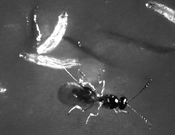
IRIS login | Reed College home Volume 96, No. 2: June 2017
Bio Prof Studies Insect Arms Race

WHEN WASPS ATTACK. This parasitic wasp is about to lay eggs in fruit-fly larva. A movie you don't want to watch.
Prof. Todd Schlenke [biology 2013-] has won a $373,000 grant from the National Institute of Allergy and Infectious Diseases, division of the National Institutes of Health, to study one of nature's most unforgiving arms races-- the struggle between fruit flies and venomous parasitic wasps.
Prof. Schlenke's project is titled “A Model System for Host-Pathogen Interactions: Drosophila and Its Parasitic Wasps” and will explore how parasites suppress host immune responses, using the fruit fly Drosophila melanogaster and its natural parasitic wasps as a model host-parasite pair. The work will identify and characterize the venom (virulence) proteins that wasps use to suppress conserved aspects of host innate immunity. By characterizing venom repertoires across a phylogeny of wasps, patterns of parasite virulence strategy evolution will be uncovered.
Drosophila melanogaster is a model system for the molecular genetics of innate immunity, but little is known about the life history and virulence strategies of its natural parasites. Parasitic wasps can infect fruit-fly larvae at frequencies greater than 50% in natural populations, and are highly amenable to laboratory and field study.
Prof. Schlenke and his students at Reed have developed a collection of 17 live wasp parasite strains, and robust protocols for extracting and manipulating the venom cocktails they use to thwart the host cellular encapsulation response mounted against their eggs.
Schlenke proposes to identify the venom gland contents of 10 related wasp species that are highly successful. He will then assay the effects of whole venom from each wasp species, and use population genetic and molecular evolution approaches to uncover how venoms maintain virulence function in their co-evolutionary arms race with host immune systems.
Tags: professors, bio, awards


LATEST COMMENTS
steve-jobs-1976 I knew Steve Jobs when he was on the second floor of Quincy. (Fall...
Utnapishtim - 2 weeks ago
Prof. Mason Drukman [political science 1964–70] This is gold, pure gold. God bless, Prof. Drukman.
puredog - 1 month ago
virginia-davis-1965 Such a good friend & compatriot in the day of Satyricon...
czarchasm - 4 months ago
John Peara Baba 1990 John died of a broken heart from losing his mom and then his...
kodachrome - 7 months ago
Carol Sawyer 1962 Who wrote this obit? I'm writing something about Carol Sawyer...
MsLaurie Pepper - 8 months ago
William W. Wissman MAT 1969 ...and THREE sisters. Sabra, the oldest, Mary, the middle, and...
riclf - 10 months ago